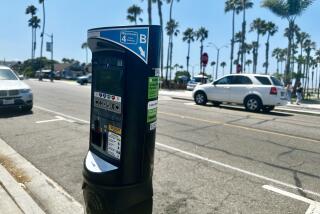GR8 PL8 DEB8 : Bell Gardens: The city manager gives up his ‘cold’ license plate designation --usually reserved for investigators--after a controversy erupts.
- Share via
The great plate debate has ended in Bell Gardens.
It was common practice for Bell Gardens city managers to have their vehicles equipped with so-called “cold” license plates, which the California Vehicle Code says can be requested by a police chief or district attorney for city employees who are engaged in “investigating actual or suspected violations of the law.” So Police Chief Andy Romero requested the plates for City Manager Charles Gomez’s city vehicle.
A political firestorm erupted. When the smoke cleared, Gomez gave up the special plates, saying that they were not worth the aggravation.
“Cold” plates, which look like ordinary license plates, are coded to make it difficult to access information about the driver from the Department of Motor Vehicles, said DMV spokesman Bill Madison. They are issued primarily to police officers, judges and district attorneys, and are often requested by police agencies for use by undercover officers.
The controversy started when residents all over town received flyers in the mail charging that Gomez and Romero “allegedly participated in perjury of documents violating the California Vehicle Code.” The flyers, a one-page newsletter called Current Times, were headlined “Police Chief and City Manager Allegedly Involved in Conspiracy and Perjury Scandal.” The origin of the newsletter, which appears to have been printed on a desktop publishing system, was not included.
Gomez speculated that it was distributed to smear council incumbents Josefina Macias and Rosa Hernandez, who voted to hire him and Romero. Neither Macias nor Hernandez, who are up for reelection in the April 12 election, are mentioned in the newsletter, however. Neither returned calls for comment.
“Having this flyer mailed to every house in the city is not a good thing to happen right before an election,” Gomez said.
Gomez said he filled out a DMV form requesting the plates after city staff members told him two former city managers had used them.
He said the idea of having undercover plates on his car appealed to him because they would be less conspicuous than exempt plates, the familiar official tags with an “E” in a hexagon preceding the plate numbers.
The flyer, however, suggested a different motive. “Maybe you should ask City Manager Gomez if he was able to avoid a traffic citation while driving a vehicle with undercover police plates,” the flyer states. “Is this his intent?”
Romero said he signed the DMV form authorizing Gomez to receive the plates because he also understood previous city managers had them. The plates were placed on Gomez’s city vehicle in February.
City Atty. Mike Estrada said he interpreted the vehicle code to mean Gomez could legally use the plates because he is often called to investigate code violations.
Although the vehicle code, when taken literally, restricts use of the plates to law enforcement officers, Gomez’s use of the plates is not illegal, “but may be unethical,” Madison said.
The DMV does not investigate vehicle code violations unless it receives a complaint, Madison said. The department relies on police personnel and district attorneys who apply for “cold” plates to police themselves, he said.
Bell Gardens officials have ordered exempt plates--used on all government vehicles--to replace Gomez’s non-exempt plates. Neither non-exempt nor exempt plates allow drivers special privileges, but license and registration fees are waived for both.
Councilman George Deitch said that he is satisfied with Gomez’s offer to remove the non-exempt plates, but he does not believe that Romero should have signed the form in the first place and has called on the council to reprimand Romero and Gomez.
More to Read
Sign up for Essential California
The most important California stories and recommendations in your inbox every morning.
You may occasionally receive promotional content from the Los Angeles Times.













